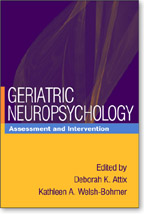 by Edited by Deborah K. Attix and Kathleen A. Welsh-Bohmer
by Edited by Deborah K. Attix and Kathleen A. Welsh-Bohmer
This major clinical reference and text is the first volume to systematically address the entire process of neuropsychological assessment and intervention with older adults.
Full Description:
This major clinical reference and text is the first volume to systematically address the entire process of neuropsychological assessment and intervention with older adults. The expert editors and contributors detail the current state of knowledge about frequently encountered conditions ranging from mild cognitive impairment to progressive, stable, and reversible dementias. Evidence-based assessment and intervention strategies are described, and specific guidance is provided for linking neuropsychological evaluation to individualized treatment planning. Demonstrating an array of cognitive training, compensatory, and psychotherapeutic approaches, the volume shows how these can successfully be used to improve patients' functioning and quality of life. "Superb! The editors and contributors are to be congratulated for producing this benchmark text for advanced graduate students, residents, and practitioners of geriatric neuropsychology. A unique feature of the text is its synthesis of intervention with assessment. Moreover, it provides detailed empirical support for using cognitive training, compensatory techniques, and psychotherapeutic interventions for improving mood, behavior, and functional capacity, even in disorders where progression is inexorable. Well written, thoroughly referenced, and up to date, this book is a powerful antidote to the therapeutic nihilism that often surrounds psychological work with dementia patients."
-Jason Brandt, PhD, Department of Psychiatry and Behavioral Sciences, The Johns Hopkins University School of Medicine
467 Pages, 7 x 10
Introduction
I. Geriatric Neuropsychological Assessment
A. Assessment of Common Geriatric Conditions
1. An Integrated Model for Geriatric Neuropsychological Assessment, Guy G. Potter and Deborah K. Attix
2. Normal Aging and Mild Cognitive Impairment, Glenn Smith and Beth K. Rush
3. Neurodegenerative Dementias, Kathleen A. Welsh-Bohmer and Lauren H. Warren
4. Stable and Slowly Progressive Dementias, M. Allison Cato and Bruce A. Crosson
5. Potentially Reversible Cognitive Symptoms in Older Adults, Wes S. Houston and Mark W. Bondi
B. Specific Considerations
6. Using Norms in Neuropsychological Assessment of the Elderly, Robyn M. Busch, Gordon J. Chelune, and Yana Suchy
7. Functional Assessment, Daniel Marson and Katina R. Hebert
8. Cultural Issues, Jennifer J. Manly
9. Feedback, Joanne Green
II. Geriatric Neuropsychological Intervention
A. Cognitive Training and Compensatory Techniques
10. An Integrated Model for Geriatric Neuropsychological Intervention, Deborah K. Attix
11. Training of Cognitive and Functionally Relevant Skills in Mild Alzheimer's Disease: An Integrated Approach, David Loewenstein and Amarilis Acevedo
12. Spaced Retrieval: A Model for Dissemination of a Cognitive Intervention for Persons with Dementia, Cameron J. Camp
13. Multitechnique Program Approaches, Linda Clare
14. Rehabilitation of Language Impairments in Dementia, Cynthia K. Thompson and Nancy Johnson
15. External Aids, Michelle S. Bourgeois
B. Psychotherapeutic Interventions
16. Behavioral Treatment of Affective Disorders and Associated Symptoms, Rebecca G. Logsdon, Susan M. McCurry, and Linda Teri
17. Behavioral Treatment of Impaired Functioning and Behavioral Symptoms, Ann Louise Barrick
18. Group Psychotherapy Approaches for Dementia, Guy G. Potter, Deborah K. Attix, and Cory K. Chen
19. Pharmacological and Other Treatment Strategies for Alzheimer's Disease, Kathleen Hayden and Mary Sano
|